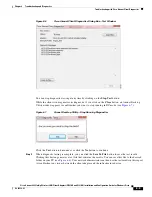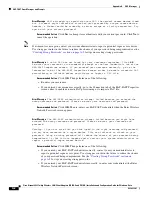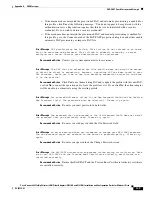
A-9
Cisco Aironet 802.11a/b/g Wireless LAN Client Adapters (CB21AG and PI21AG) Installation and Configuration Guide for Windows Vista
OL-16534-01
Appendix A EAP Messages
Creating Strong Passwords
Creating Strong Passwords
Never write passwords down, on paper or online. Instead, create passwords that you can remember easily
but no one can guess easily. One way to do this is create a password that is based on a song title,
affirmation, or other phrase. For example, the phrase could be “This May Be One Way To Remember”
and the password could be “TmB1w2R!” or “Tmb1W>r~” or some other variation.
Note
Do not use either of those examples as passwords.
Characteristics of Strong Passwords
Strong passwords have the following characteristics:
•
Contain both upper and lower case characters (e.g., a-z, A-Z).
•
Contain numerals and punctuation as well as letters (e.g., 0-9, !@#$%^&*()_+|~ =\`{}[]:";'<>?,./)
•
Are at least five alphanumeric characters long.
•
Are not a word in any language.
•
Are not slang, dialect, or jargon.
•
Are not based on personal information, such as the names of family members.
Characteristics of Weak Passwords
A weak password has the following characteristics:
•
Contains fewer than eight characters.
•
Is a word found in a dictionary (English or foreign)
•
Is any other term that is easily guessed or found in common usage. The following are examples of
terms that are easily guessed:
–
The name of family, pet, friend, coworker, or fantasy character.
–
A computing term or name, such as a command, site, company, model, or application.
–
A birthday or another kind of personal information, such as an address or telephone number.
–
A predictable letter pattern or number pattern, such as aaabbb, qwerty, zyxwvuts, or 123321.
–
Any of the above spelled backwards.
–
Any of the above preceded or followed by a digit.
















































